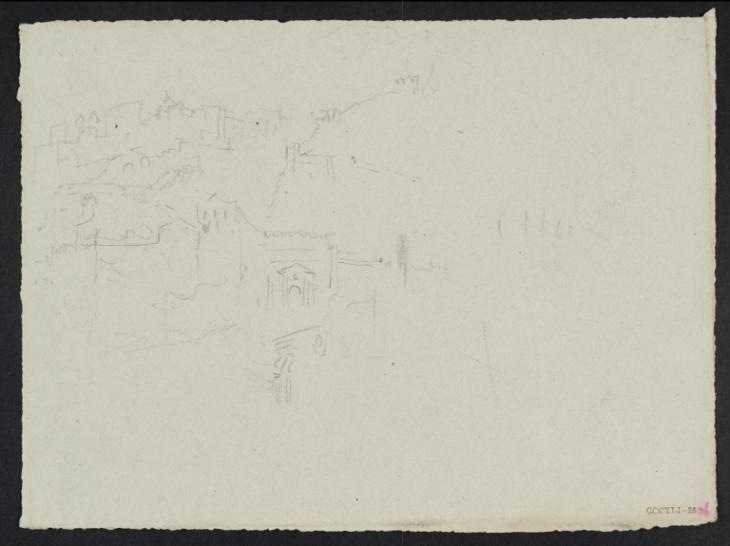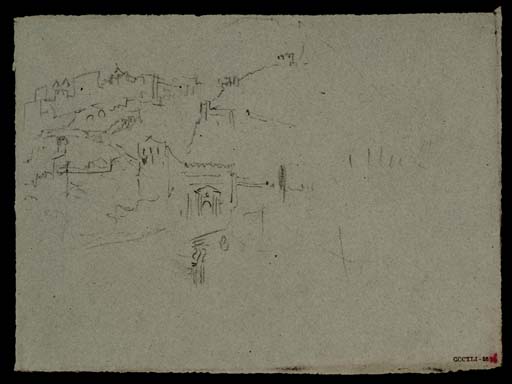J.M.W. Turner
>
1819-29 Italy and after
>
Italy c.1828-43
>
Artwork
Joseph Mallord William Turner An ?Italian Hill Town, with a Fortified Gateway c.1828-43
Image 1 of 2
Joseph Mallord William Turner,
An ?Italian Hill Town, with a Fortified Gateway
c.1828-43
Joseph Mallord William Turner 1775–1851
An ?Italian Hill Town, with a Fortified Gateway c.1828–43
D33705
Turner Bequest CCCXLI 26
Turner Bequest CCCXLI 26
Pencil on grey wove paper, 141 x 193 mm
Blind-stamped with Turner Bequest monogram below right of centre
Inscribed in red ink ‘26’ bottom right
Stamped in black ‘CCCXLI – 26’ bottom right
Blind-stamped with Turner Bequest monogram below right of centre
Inscribed in red ink ‘26’ bottom right
Stamped in black ‘CCCXLI – 26’ bottom right
Accepted by the nation as part of the Turner Bequest 1856
References
1830
A.J. Finberg, A Complete Inventory of the Drawings of the Turner Bequest, London 1909, vol.II, p.1066, CCCXLI 26, as ‘Buildings on hillside’, c.1830–41.
1999
Peter Bower, Turner’s Later Papers: A Study of the Manufacture, Selection and Use of his Drawing Papers 1820–1851, exhibition catalogue, Tate Gallery, London 1999, p.110 note 1.
The subject is unidentified, but may be Italian; see the Introduction to this section for further brief discussion and dating. There may be a bridge in the foreground, or possibly it is a separate architectural note below the castellated gateway surrounding a classical arch with a pediment. Finberg plausibly suggested that Tate D33706 and D33707 (Turner Bequest CCCXLI 27, 28) show the same site.1
Technical notes:
This drawing was made on one sixteenth of an Imperial-format sheet (overall approximately 559 x 762 mm; 22 x 30 inches) of ‘medium-weight pale grey-green wove’ paper, made by Thomas Smith and Henry Allnutt of Great Ivy Mill, Maidstone, Kent.1 Paper conservator Peter Bower has identified all but a handful of the constituents of three such sheets, each with the watermark ‘Smith & Allnutt | 1827’, which were carefully torn up by Turner for sketching.2 They are ‘the only examples of his working on coloured papers from this maker’, although he had previously used their white wove papers.3
These torn-up sheets all fall within an extensive grouping dated in Finberg’s 1909 Inventory to about 1830–41, comprising drawings of similar format and technique:
Miscellaneous: Black and White. | (a) Grey Paper. | A number of sketches of mountain scenery, mostly unidentified. Among them are probably German subjects, in the neighbourhood of the Rhine and Danube, scenes in the Austrian Alps and North Italy, as well as scenes in Switzerland and elsewhere. | The drawings are grouped according to the paper they are made on.4
Presumably on the advice of Tate curators, Bower dates the use of one of these virtually reconstructed sheets to 1840, when Turner travelled to Venice via Germany, without further elaboration or discussion of the individual subjects;5 by implication the others were used around that time. Although it seems likely that these torn-up sheets were used within a short period at a relatively late stage of Turner’s career and perhaps kept together in bundles at least initially, the subjects, dating and sequence of use after their 1827 manufacture, and hence the precise relationships between these and other sheets in Finberg’s portmanteau ‘Grey Paper’ section among which they are widely scattered, remain to be confirmed.
See ibid. and p.110 note 1 for the individual Turner Bequest numbers of the identified works; as a result of Bower’s wider survey of Turner’s papers, at the time of writing numerous small batches of Turner Bequest works on grey paper are kept together in annotated folders, indicating that they have been identified as systematically torn from specific large sheets.
Verso:
Blank; inscribed by John Ruskin in pencil ‘234 | O’ bottom right. The surface is stained, perhaps through water damage in the 1928 Tate Gallery flood.
Matthew Imms
February 2016
How to cite
Matthew Imms, ‘An ?Italian Hill Town, with a Fortified Gateway c.1828–43 by Joseph Mallord William Turner’, catalogue entry, February 2016, in David Blayney Brown (ed.), J.M.W. Turner: Sketchbooks, Drawings and Watercolours, Tate Research Publication, November 2016, https://www


